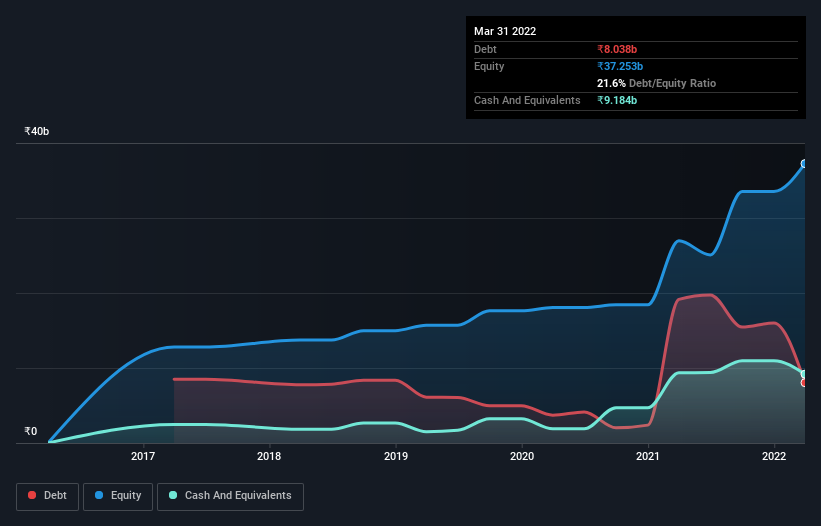
Legendary fund manager Li Lu (who Charlie Munger backed) once said, 'The biggest investment risk is not the volatility of prices, but whether you will suffer a permanent loss of capital.' So it might be obvious that you need to consider debt, when you think about how risky any given stock is, because too much debt can sink a company. As with many other companies Tube Investments of India Limited (NSE:TIINDIA) makes use of debt. But should shareholders be worried about its use of debt?
When Is Debt Dangerous?
Debt is a tool to help businesses grow, but if a business is incapable of paying off its lenders, then it exists at their mercy. Ultimately, if the company can't fulfill its legal obligations to repay debt, shareholders could walk away with nothing. While that is not too common, we often do see indebted companies permanently diluting shareholders because lenders force them to raise capital at a distressed price. Having said that, the most common situation is where a company manages its debt reasonably well - and to its own advantage. The first thing to do when considering how much debt a business uses is to look at its cash and debt together.
See our latest analysis for Tube Investments of India
How Much Debt Does Tube Investments of India Carry?
The image below, which you can click on for greater detail, shows that Tube Investments of India had debt of ₹8.04b at the end of March 2022, a reduction from ₹19.1b over a year. However, its balance sheet shows it holds ₹9.18b in cash, so it actually has ₹1.15b net cash.

How Strong Is Tube Investments of India's Balance Sheet?
Zooming in on the latest balance sheet data, we can see that Tube Investments of India had liabilities of ₹47.1b due within 12 months and liabilities of ₹4.51b due beyond that. Offsetting this, it had ₹9.18b in cash and ₹20.1b in receivables that were due within 12 months. So its liabilities total ₹22.4b more than the combination of its cash and short-term receivables.
Since publicly traded Tube Investments of India shares are worth a total of ₹423.1b, it seems unlikely that this level of liabilities would be a major threat. But there are sufficient liabilities that we would certainly recommend shareholders continue to monitor the balance sheet, going forward. Despite its noteworthy liabilities, Tube Investments of India boasts net cash, so it's fair to say it does not have a heavy debt load!
Better yet, Tube Investments of India grew its EBIT by 180% last year, which is an impressive improvement. That boost will make it even easier to pay down debt going forward. The balance sheet is clearly the area to focus on when you are analysing debt. But ultimately the future profitability of the business will decide if Tube Investments of India can strengthen its balance sheet over time. So if you're focused on the future you can check out this free report showing analyst profit forecasts.
But our final consideration is also important, because a company cannot pay debt with paper profits; it needs cold hard cash. While Tube Investments of India has net cash on its balance sheet, it's still worth taking a look at its ability to convert earnings before interest and tax (EBIT) to free cash flow, to help us understand how quickly it is building (or eroding) that cash balance. Over the most recent three years, Tube Investments of India recorded free cash flow worth 58% of its EBIT, which is around normal, given free cash flow excludes interest and tax. This free cash flow puts the company in a good position to pay down debt, when appropriate.
Summing Up
We could understand if investors are concerned about Tube Investments of India's liabilities, but we can be reassured by the fact it has has net cash of ₹1.15b. And we liked the look of last year's 180% year-on-year EBIT growth. So is Tube Investments of India's debt a risk? It doesn't seem so to us. We'd be very excited to see if Tube Investments of India insiders have been snapping up shares. If you are too, then click on this link right now to take a (free) peek at our list of reported insider transactions.
Of course, if you're the type of investor who prefers buying stocks without the burden of debt, then don't hesitate to discover our exclusive list of net cash growth stocks, today.
Valuation is complex, but we're here to simplify it.
Discover if Tube Investments of India might be undervalued or overvalued with our detailed analysis, featuring fair value estimates, potential risks, dividends, insider trades, and its financial condition.
Access Free AnalysisHave feedback on this article? Concerned about the content? Get in touch with us directly. Alternatively, email editorial-team (at) simplywallst.com.
This article by Simply Wall St is general in nature. We provide commentary based on historical data and analyst forecasts only using an unbiased methodology and our articles are not intended to be financial advice. It does not constitute a recommendation to buy or sell any stock, and does not take account of your objectives, or your financial situation. We aim to bring you long-term focused analysis driven by fundamental data. Note that our analysis may not factor in the latest price-sensitive company announcements or qualitative material. Simply Wall St has no position in any stocks mentioned.
About NSEI:TIINDIA
Tube Investments of India
Engages in the manufacture and sale of precision engineered and metal formed products to automotive, railway, construction, agriculture, etc.
Excellent balance sheet with questionable track record.


